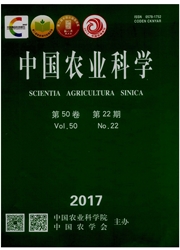

 中文摘要:
中文摘要:
农田碳库是全球碳库最活跃的部分,对管理措施变化的响应十分敏感。灌溉技术作为中国旱作农业的重要管理措施,其变化势必会对农田温室效应贡献及土壤碳固存能力产生重要影响,但相关试验数据及机理研究迄今仍十分缺乏。文章综述了灌溉对农田土壤呼吸及其不同组分、氧化亚氮(N20)与甲烷(CH4)源汇通量以及农田土壤碳储量变化的定量影响,比较了上述参数变化对不同灌溉方式、灌溉量、灌溉频率、灌溉年限以及灌溉水质等的差异响应,剖析了可能的影响机制。分析表明:(1)灌溉通常将增加土壤的碳排放,但土壤呼吸与灌溉量间并非线性关系。在水分亏缺条件下,土壤呼吸与灌溉量呈现正相关,而过量灌溉则会降低土壤呼吸;灌溉影响土壤呼吸的温度敏感性(Q10),Q10与灌溉量之间呈抛物线关系,漫灌方式下土壤呼吸的温度敏感性高于滴灌;不同灌溉方式下土壤呼吸不同组分的贡献率及其对水分变化的响应存在较大差异,灌溉对根系呼吸的影响较对土壤微生物呼吸的影响更为显著,滴灌条件下根系呼吸对土壤呼吸的贡献率显著大于漫灌;灌溉水质与灌溉深度显著影响土壤温室气体释放总量,开展充分的市政污水处理能够为国家和地区换取更多的碳排放信用。(2)水分管理是减缓农田N2O与CH4排放的重要措施,水分状况对N2O与CH4的产生过程与排放途径均存在重要影响;水分管理对CH4和N2O排放的影响往往存在明显的消长关系,采用全球增温潜势(GWPs)等综合性评价指标才能更加准确与全面地反映灌溉及其不同方式所带来的农田温室效应贡献变化。(3)水分变化对土壤有机碳存在增加、降低或不显著等多种可能影响。不同气候、土壤类型下表层有机碳含量变化对灌溉的响应存在明显不同,灌溉在相对干旱地区对土壤?
 英文摘要:
英文摘要:
Agricultural carbon (C) pool is one of the most active parts in global terrestrial ecosystem C pool and is very sensitive to change in management measures. As an important means for dry farming in China to get high yield, irrigation and its change in patterns certainly will have a significant impact on the ecosystem C budget and its atmospheric greenhouse effect, but the relative data and corresponding mechanism analysis are rarely known. This paper reviews research progresses in the quantitative impacts of irrigation on soil respiration and its different components, the fluxes of nitrous oxide and methane as well as soil C storage, and compares the differential responses of the above-mentioned processes to different irrigation patterns, amounts, frequencies, lasting periods and irrigation water quality, etc. The results indicate that irrigation generally will increase soil C emission, but the relationship between irrigation quota and soil carbon dioxide (CO2) effiuxes is nonlinear. Water additions stimulate soil CO2 emission when soil is under water deficit condition, whereas excessive irrigation would decrease soil respiration rates. Irrigation increases the sensitivity of soil respiration to temperature change (Qlo), and the response of Ql0 to the irrigation amounts can describe as a parabola. The Ql0 values under drip irrigation are larger than those under flood irrigation. There is a great difference in the response of different respiration components to the change of soil water under different irrigation methods, and the effect of irrigation on root respiration is more significant than on soil microbial respiration. The ratios of root respiration contribution to soil respiration under drip irrigation are much larger than those under flood irrigation. Irrigation water quality and irrigation depth also have an important impact on total emission amount of greenhouse gases, and full municipal wastewater treatment can obtain much more carbon emission credits for countries and regions. Water
 同期刊论文项目
同期刊论文项目
 同项目期刊论文
同项目期刊论文
 Litter decomposition and the C and N dynamics as affected by N additions in a semi-arid temperate st
Litter decomposition and the C and N dynamics as affected by N additions in a semi-arid temperate st Differential responses of short-term soil respiration dynamics to the experimental addition of nitro
Differential responses of short-term soil respiration dynamics to the experimental addition of nitro Interactions of water and nitrogen addition on soil microbial community composition and functional d
Interactions of water and nitrogen addition on soil microbial community composition and functional d Response of N2O emission to water and nitrogen addition in temperate typical steppe soil in Inner Mo
Response of N2O emission to water and nitrogen addition in temperate typical steppe soil in Inner Mo 期刊信息
期刊信息
